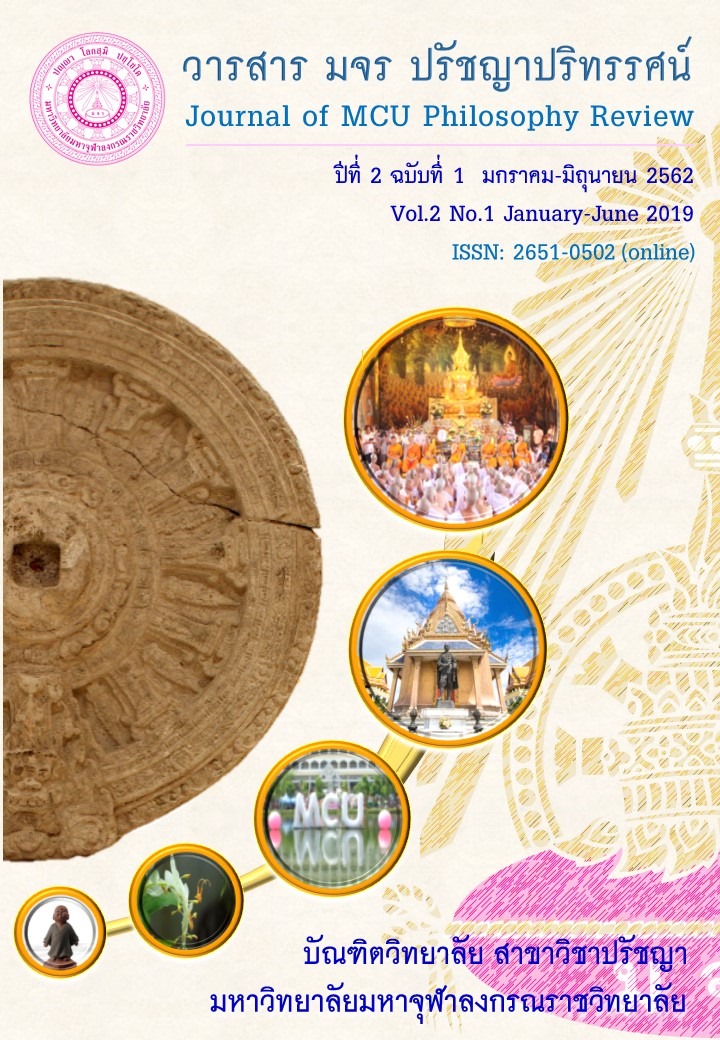Buddhist mediation method of dispute
Main Article Content
Abstract
This article there are two purposes. (1) To present the dispute in court. (2) To present the Buddhist mediation method, the dispute by the author use the method of dispute analysis in court, then present the Buddhist method. Dispute in court arise from the plaintiff wishes to take the defendant. To be violated, such as controversy, scandal, etc. The method of mediating the dispute is to adopt the principle called Brahmavihara. It means that you are in the mood for good or to keep them locked in the best. The moral is 4. 1) Mercy is means good heart. Love is the best wishes without any return. 2) Please be compassionate means mercy. Desire for others suffering. 3) Muthita is a kind of gentle mind, it refers to the mind without any envy. Be happy when others are happy. 4) Detachment refers to the inactivity of emotions. Trust is neutral, there is a fair balance as a brand. I do not care about love and hate. Not biased towards anyone. Frost tried to create tools and mechanisms to match justice and fair by the people in the judicial process. To consider questions or concerns. This will be useful for resolving disputes in different cases. The conciliator applied the above principles to the effect, success in reconciliation and depending on the proper use for the plaintiff and the defendant. By choosing the right Buddhist principles. I found the dispute. To settle the dispute in court, a fair alternative court held.
Article Details
บทความที่ได้รับการตีพิมพ์เป็นลิขสิทธิ์ของวารสาร มจร ปรัชญาปริทรรศน์
ข้อความในบทความที่ได้รับการตีพิมพ์ในวารสาร ถือเป็นความรับผิดชอบของผู้เขียนบทความ และข้อคิดเห็นนั้นไม่ถือว่าเป็นทัศนะและความรับผิดชอบของกองบรรณาธิการวารสาร มจร ปรัชญาปริทรรศน์
References
ธนรัตน์ ทั่งทอง. (2550). การบริหารจัดการระบบไกล่เกลี่ยข้อพิพาททางอาญา สำนักระงับข้อพิพาท สำนักงานศาลยุติธรรม. กรุงเทพมหานคร : บริษัท ธนาเพรส จำกัด.
ปรัชญา อยู่ประเสริฐ. (2550). เทคนิคจิตวิทยาบรรณานุกรม (REFERENCE) สื่อสารสำหรับการไกล่เกลี่ยข้อพิพาท. กรุงเทพมหานคร: บริษัท ธนาเพรส จำกัด.
ประสิทธิ์ ดวงตะวงษ์. (2550). ARD today ฉบับพิเศษ สำนักระงับข้อพิพาท. กรุงเทพมหานคร : หจก. อรุณการพิมพ์.
พระพรหมคุณาภรณ์ (ป.อ. ปยุตฺโต). (2557). พจนานุกรมพุทธศาสตร์ ฉบับประมวลธรรม. พิมพ์ครั้งที่ 40. กรุงเทพมหานคร : สำนักพิมพ์ผลิธัมม์.
มหาจุฬาลงกรณราชวิทยาลัย. (2539). พระไตรปิฎกภาษาไทย ฉบับมหาจุฬาลงกรณราชวิทยาลัย. กรุงเทพมหานคร : โรงพิมพ์มหาจุฬาลงกรณราชวิทยาลัย.
พระดำรัสพระเจ้าหลานเธอ พระองค์เจ้าพัชรกิติยาภา. (2554). “การบริหารจัดการความขัดแย้งในทางอาญา”. วารสาร ดุลพาห, ปีที่ 58 ฉบับที่ 1 (มกราคม-เมษายน 2554): 1-2.
วรณัฏฐ์ สังข์ใหม่. (2550). การบริหารจัดการระบบไกล่เกลี่ยข้อพิพาทในศาล. กรุงเทพมหานคร : บริษัท ธนาเพรส จำกัด.


